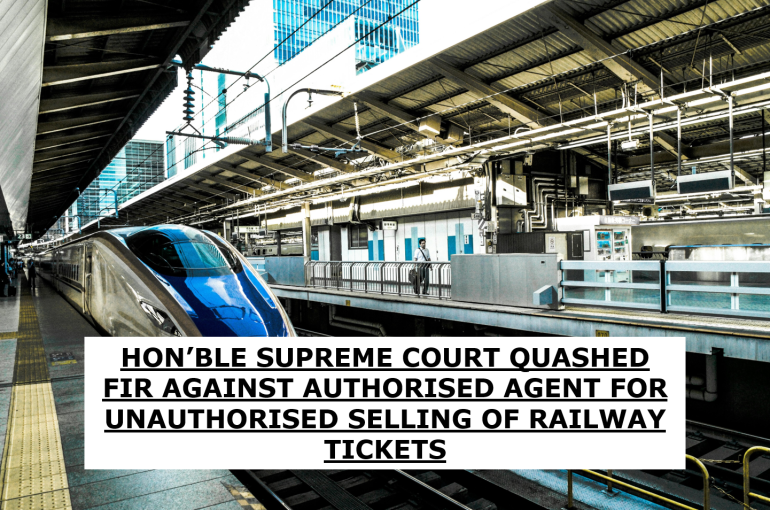HON’BLE SUPREME COURT QUASHES FIR AGAINST AUTHORISED AGENT FOR UNAUTHORISED SELLING OF RAILWAY TICKETS
A two Judge Bench of the Hon’ble Supreme Court comprising of Justice Dipankar Datta and Justice Prashant Kumar Mishra in the matter of J. Ramesh versus Union of India Criminal Appeal No. 4169/2024 Arising Out Of SLP (Criminal) No. 2408/2017 where in Bench passed a judgement dated 06.01.2025 that the illegal sale of ticket by the authorised agent does not attract offence of Section 143 of the Railways Act, 1989 (Act) (Penalty for unauthorised carrying on of business of procuring and supplying of Railway tickets).
Facts-
The present case involves the question of law on the interpretation of Section 143 of the Act. Two Special Leave Petitions were filed, one by the State against the decision of Hon’ble Kerala High Court in Criminal Miscellaneous Case No. 1991/2016 dated 22.09.2016 quashing the FIR under Section 143 of the Act against Mathew K. and the other by the accused J. Ramesh (authorized agent of Railway) against the decision of Hon’ble Madras High Court in CRL. MP. Nos.7328/2020 dated 30th June, 2022, pertaining to the same offence. The FIR arose out of search conducted by the Railway Protection Force (RPF) in the office of Mathew, on the basis of information for the illegal sale of e-railway tickets and the creation of fraudulent user IDs with the Indian Railway Catering and Tourism Corporation for the procurement of the same. Aggrieved by the FIR, Mathew moved to Hon’ble Kerala High Court and proceedings were quashed against him. In a connected appeal Ramesh was booked by the RPF, for the similar offence of selling e- tickets and creation of multiple user ID. However, the criminal proceeding against him were refused to be quashed by the Hon’ble Madras High Court vide Order dated 30th June, 2022.
Prosecution, in its argument stated that Section 143 of the Act does not permit the authorised agents to carry out unauthorized actions under the façade of authorization. Purpose of the Section is to limit the number of tickets that an individual can purchase using his personal ID, so the touting of railway tickets is prevented. On the other hand, joint submissions by the Accused stated that the Section 143 of the Act does not criminalize the creation of multiple IDs and legislature intentions was only to penalize the sale of physical tickets, not e-tickets, as e- ticketing could not have been conceptualized by the legislature at the time of passing the Act, due to absence of internet at that time.
Issue
- Whether the Act of creating fake/multiple user IDs by an individual, who may or may not be an authorized Railway Agent, with the intention to procure and supply online tickets through IRCTC portal would constitute an offence under Section 143 of the Act?
Decision of the Hon’ble Supreme Court
Hon’ble Supreme Court relying on the judgement of Senior Electric Inspector v. Laxminarayan, AIR 1962 SC 159 where it was held that when, after the enactment of a legislation, new facts and situations arise which could not have been in its contemplation, the statutory provisions could properly be applied to them if the words thereof are in a broad sense capable of containing them.
Based on the above judgement and principle, the Hon’ble Bench rejected the argument of the Accused that the Section 143 of the Act does not apply to the sale of e-ticket as it lacks the legislative intent and the foresightedness of the legislature, when it was enacted. Hon’ble Bench opiniated that the mere fact of the system of e-reservation and e-tickets being introduced after the enactment of the Act, does not render the provision toothless to combat illegal sale of e-tickets, it does not make any distinction between the physical and online sale of tickets.
Hon’ble Supreme Court, while interpreting the Section 143 of the Act, observed that the objective of the Section is to restrict the business of procurement and supply of Railway tickets by the unauthorized entities only, irrespective of the mode of procurement and supply. Section is completely silent on creation of multiple user IDs and only penalizes the actions of unauthorized agents and not of authorised entities.
As a result, Ramesh, who was an authorized agent of the Railways for selling tickets, was not held liable for the criminal proceedings, as Section 143 only applies to the unauthorized entities and the FIR against him was quashed. Although, his acts made him entitled for the civil action, for breaching the contract with the Railways. However, criminal proceedings against Mathew were reinstated as Mathew was carrying on the business of procurement and supply of Railway tickets without the authorisation of the Railway, Hence, his acts made him liable for the offence under Section 143 of the Act.
Conclusion-
Hon’ble Supreme Court while interpreting Section 143 of the Act, highlighted the potential loophole that saved Ramesh from the criminal proceedings for an offence, for which Mathew K. was found liable. In the present case, Hon’ble Court affirmed to the broad applicability of the Section 143 to the modern technological developments like e-ticketing, while maintaining its primary objective of curbing ticket touting.
RITIK KUMAR
INTERN
THE INDIAN LAWYER & ALLIED SERVICES
If you want to learn more on the impact of Lease Agreements visit our YouTube channel The Indian Lawyer Legal Tips on the link below –





































Leave a Reply